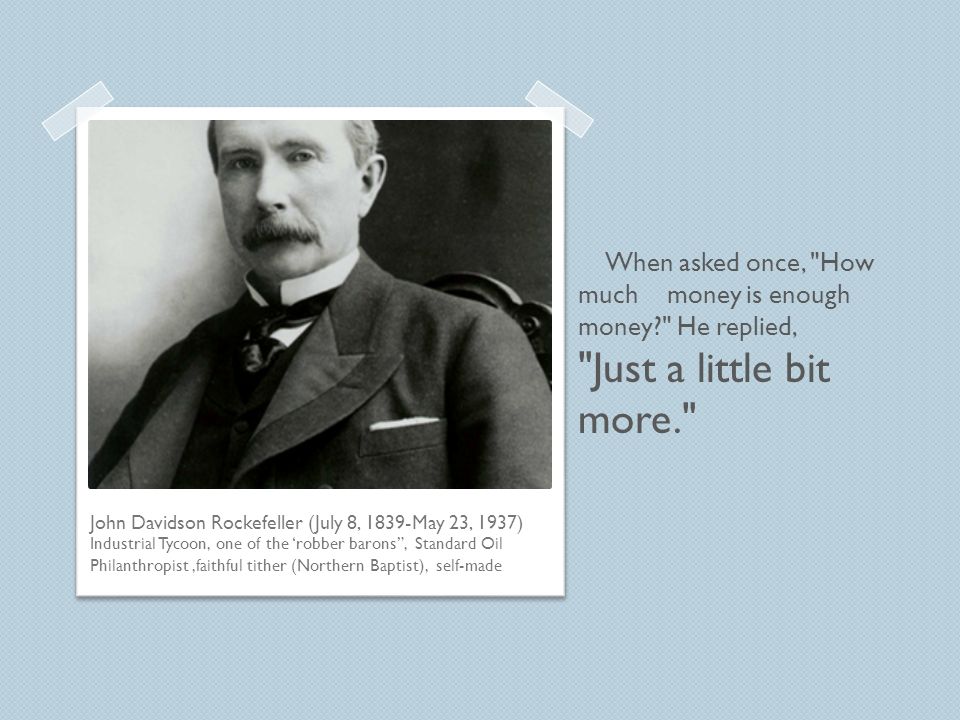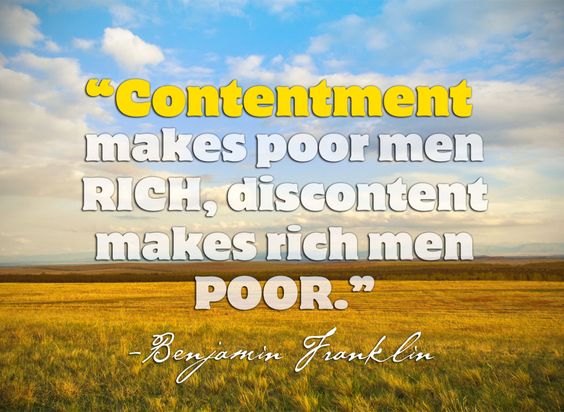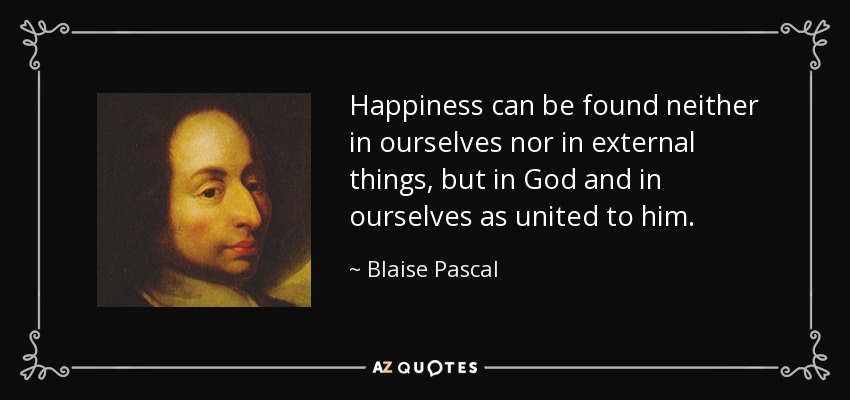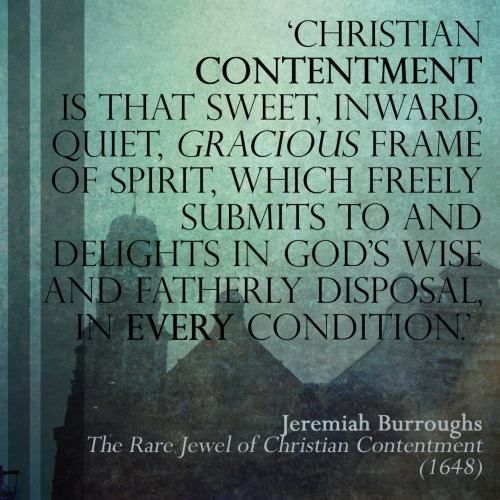Click here to return to Blog Post Intro

It’s easy to look at the external symptoms—anger, moderate depression, lack of joy, being filled with self and unable to love—and see them as our biggest problems. However, the root cause of these issues is the sin of discontent.
Over one hundred years ago, J.C. Ryle wrote, “Two things are said to be very rare sights in the world—one is a young man humble, and the other is an old man content. I fear this saying is only too true.”
John Piper’s Desiring God has a now famous line, “God is most glorified in us when we are most satisfied in him,” is a biblical truth that we would do well to ponder.
Contentment is essential to holiness; and it must be learned and pursued pursue contrary to our natural ways of thinking.
PURSUING CONTENTMENT
The Nature of Christian Contentment
We often think that if we had the right job, house, talent, or spouse, we’d be happy and content. But because these things are just out of reach, so is contentment—or so the common wisdom goes. The search for happiness based on our circumstances in life creates a restlessness and discontent in our souls.
If we want to learn contentment, a good place to start is by meditating on Philippians 4:11-13 –
- You can be content. Contentment is attainable. Paul attained it and not because he was a spiritual superstar. He says, “I can do all things through him who strengthens me.” The same God who strengthens Paul also strengthens all who believe in Christ.”
- You need to learn contentment. Twice in Philippians 4:11-13 Paul specifically says that he has “learned” to be content. Learning contentment is contrary to our normal (and sinful) ways of thinking. The world says that to be content you need to get out of a bad situation. The Bible says that we are to find contentment in the midst of difficult circumstances. The world says contentment comes by getting what you want in this world. The Bible teaches that true contentment comes by being satisfied with God and longing for heaven.
- You will not be truly content until you learn to be content in every situation that you face in life. Recognizing the inevitability of hardship helps us face them with a certain degree of contentment. When we accept all hardships as from the hand of our heavenly Father, we grow in maturity, holiness, and contentment. Contentment comes not by finding conditions suitable to us but by God’s fashioning our spirits to our conditions.
- You should understand contentment as “self–” The Greek word in verse 11 that is typically translated as “content” literally means “self-sufficient.” Our world generally settles for quick fixes to heal the discontent of the soul, but true contentment comes only by addressing heart issues. In The Rare Jewel of Christian Contentment, Jeremiah Burroughs provides this definition, “Christian contentment is sweet, inward, quiet, gracious frame of spirit, which freely submits to and delights in God’s wise and fatherly disposal in every situation.” The type of contentment described in Philippians 4 reflects God’s self-sufficiency. As our self-sufficiency reflects God’s self-sufficiency, God’s character is revealed in us. To put it differently, our contentment brings glory to God.
The Necessity of Christian Contentment
Aesop advised, “Be content with your lot; one cannot be first in everything.” Socrates pondered, “Contentment is natural wealth, luxury is superficial poverty.”
There are seven reasons why Christians need to pursue godly contentment:
- God has commanded it. Hebrews 13:5 tells us, “Be content with what you have.”
- Contentment is a priceless treasure. Paul writes in 1 Timothy 6:6 that “there is great gain in godliness with contentment.” In this context, Paul is contrasting the pursuit of worldly riches with the pursuit of contentment.
- A murmuring spirit is great sin. The beginning of Numbers 11 forms a stark contrast: “And the people complained in the hearing of the Lord about their misfortunes, and when the Lord heard it, his anger was kindled, and the fire of the Lord burned among them and consumed some outlying parts of the camp” (v. 1). Grumbling entails forgetting God’s presence and his blessings in our lives. Grumbling is also tied to our unbelief, questioning not only God’s providence but also his provision. When we grumble, we don’t believe that God is in control, and we question his ability to make good on his promises. At the root of it, then, is a lack of faith.
- Discontent is at the root of much of our sin. Discontentment has too many traveling companions. It clearly is at the root of covetousness. The Westminster Shorter Catechism says, “(Question 80) What is required in the tenth commandment? The tenth commandment requires full contentment with our own condition, with a right and charitable frame of spirit toward our neighbor, and all that is his. (Question 81) What is forbidden in the tenth commandment? The tenth commandment forbids all discontentment with our own estate, envying or grieving at the good of our neighbor, and all inordinate motions and affections to anything that is his.” A contented spirit finds delight in what God has provided. The Bible gives several accounts in which wrong desire leads to a host of other sins. David’s desire for Bathsheba led to adultery and murder (2 Samuel 11). Ahab’s desire for Naboth’s vineyard led to bearing false witness against him and to murder (1 Kings 21). Adam and Eve’s desire led them to eat from the forbidden tree and plunged humanity into sin, death, and misery. It is vital, then, that we train the heart, learning to be content with what God has given us. As we grow in him, God takes our desires more and more away from the things of this world, placing them increasingly on himself.
- A contented spirit shows our humble submission to God’s will. A discontented spirit says, “I’m in control, and I will have what I want.”
- Without contentment, we cannot experience the peace of God. Paul was the model of contentment, speaking of the “peace of God, which surpasses all understanding” (Philippians 4:7).
- The contented spirit is the worshipful spirit. Jeremiah Burroughs states that worship is not only “doing what pleases God,” but also “being pleased with what God does.”
The Dangers of a Murmuring, Discontented Spirit
Contentment reveals the grace of God in our hearts. The negative side to this is also true—namely, murmuring and discontent reveal trouble in the soul.
Please don’t misunderstand this. Paul does not forbid a reverent complaint to God. Of the first thirteen psalms, at least three (6, 10, and 13) might be considered “psalms of complaint,” in which the psalmist reveals his struggle and wonders when God will act and come to his aid.
Habakkuk 1:1-2:1 is a particularly striking example. Habakkuk complains to God about Israel’s wickedness and complains again when God reveals His plan to chastise Israel by the hand of the more wicked Chaldeans!
When God’s people pour out legitimate complaints, God is quick to answer and sometimes quick to deliver.
Philippians 2:14-16 teaches us about a murmuring, discontented heart:
- Murmuring reveals corruption in the heart. Murmuring reveals the absence of grace. We must see a grumbling, discontented spirit as the enemy of our souls. Ultimately, our afflictions, our external circumstances, do not cause our discontent. They are simply occasions for the corruption of our heart to reveal itself.
- Murmuring is beneath the dignity of the children of God. All of the riches of god’s mercy and blessing are available to us. This should give God’s children a composure that does not mark unbelievers. As Burroughs said, our grumbling is like the child of a king crying and stomping his feet when he loses a toy. Why should we grumble and complain at the momentary troubles and afflictions of this life when God has given all things to us?
- Murmuring affects our witness for Christ. The grumbling, discontented person is a self-absorbed person. A witness must point others away from himself and to the Savior. Grumbling makes us like the world, not set apart from it.
THE MYSTERY OF CONTENTMENT
The Contentment of the Discontented Christian
Let’s look closely at Paul’s description of his own restless pressing on in Philippians 3:12-14, applying it to the pursuit of Christian contentment.
- The contented Christian is the dissatisfied Christian. He longs to know Christ, to have more intimate knowledge of him, to be conformed to his image, to share in his work. This side of glory, the Christian will never attain what he desires. He will always want more. Augustine said, “I have seen the depths, but I cannot find the bottom.”
- The contented Christian is the single-minded Christian. In Psalm 27 we have the pursuit of “one thing” in the context of worship—dwelling in the house of the Lord, gazing upon his beauty, inquiring in his temple. The goal is the same—to know the Lord, to be conformed to his image, ultimately to attain the resurrection from the dead when believers are fully conformed to the image of Christ. Fortunately for us, God has provided various ways to pursue that goal.
- The contented Christian strains forward in pursuit of a heavenly goal.
Finding Contentment in the Midst of Affliction
Paul told Timothy that “all who desire to live a godly life in Christ Jesus will be persecuted” (2 Timothy 3:12). Paul desired to know Christ and the power of his resurrection, but also to share in Christ’s sufferings (Philippians 3:10-11). We learn a number of lessons from Paul’s words:
- Contentment comes by turning our afflictions into mercies. Contentment in affliction comes by recognizing how God is working in our hardship. The world says contentment comes by finding release from afflictions. The Christian finds contentment in the midst of afflictions, by turning them into mercies. The church father Tertullian famously said, “The blood of martyrs is the seed of the church.”
- Contentment comes by performing the work of our circumstances. The sinful heart says, “Get me into a situation in which I can be content.” The Christian says, “Help me to be content in this situation and to perform the duty of it.” Contentment is the result of a transformed heart. It is not tied to external circumstances.
- Contentment comes by melting our will and desires into Christ’s will and desires. Contentment comes only when we look away from self and rest in God’s sovereign control. Contentment does not mean that we face life without pain. It does mean that in the midst of our affliction we are able to find peace in God’s sovereign control, melting our will into his.
- Contentment comes by seeking the good of others in the midst of our affliction. To have contentment in suffering, we must recognize and actively remind ourselves of the goodness of God in the midst of our affliction. God is a loving Father who cares for his children.
The Mathematics of Contentment
For a Christian to find true contentment, he must begin to see life and reality in a new way. Contentment is the result of some “new math”—adding and subtracting not according to the predominant worldly paradigm but according to biblical teaching:
- Contentment by addition—adding a new burden to our current burdens. “Chill out,” “Be happy,” “Whatever!”—these all reflect a desire for an easygoing attitude that refuses to be burdened by anything. This is especially true of the world’s attitude toward sin. But this response to the burdens of life does not adequately deal with them. The burdens always return.
- Contentment by subtraction—making our desires equal to our circumstances. A popular worldly philosophy says the way to find true contentment and peace is by subtracting from our circumstances and getting rid of things. Proper Biblical subtraction is vital for contentment. To find contentment, we must subtract from desires so that our desires and our circumstances are even and equal. This is why so many who have less than others are content in their circumstances. We need to watch what we let into our minds and hearts. Advertisements, shopping channels, and other media can inflame, not lessen, the desires of our hearts.
- Contentment by subtraction—rooting out ungodly desires. Paul writes, “Put to death therefore what is earthly in you: sexual immorality, impurity, passion, evil desire, and covetousness, which is idolatry” (Colossians 3:5). Earlier, Barcley noted that we overcome covetousness by learning contentment. At the same time, we acquire contentment only by putting covetousness to death. The mathematics of contentment requires this type of subtraction.
The Contentment of Longing for Heaven
The thought of heaven keeps the believer pressing forward. But even more than that, the contented Christian is one who longs for heaven:
- The contented Christian recognizes that his citizenship is in heaven. Paul writes, “But our citizenship is in heaven, and from it we await a Savior, the Lord Jesus Christ” (Phil. 3:20). Bible-believing Christians have sometimes been accused of being “so heavenly-minded that they are no earthly good.” Scottish preacher Eric Alexander put it simply, “Never in all my years of ministry have I met a person who is ‘too heavenly-minded.’” In fact, we are earthly-minded. We are consumed by life in this world.
- The contented Christian longs to depart and be with Christ; yet he carries on the work that Christ has given him to do. Paul said, “For me to live is Christ, and to die is gain.” Life for Paul was all about Christ. Living is Christ; and death is gain because it means more of Christ. For the contented Christian, life is Christ, and death is infinitely more of the same.
- Contentment comes by recognizing the glorious things laid up in heaven.
Finding Contentment in the Enjoyment of God
Paul’s phrase “in Christ” (alternatively, “in Him,” “in the Lord,” etc.) is used more than any other expression to summarize what it means to be a Christian and to live the Christian life. In fact, it is found more than 160 times in his letters. See how the Christian finds contentment:
- The believer finds contentment in the covenant of grace. Christ is our covenant head and representative, the mediator and “surety” (Heb. 7:22 KJV; ESV translates “guarantor”) of the covenant. When believers know that they are in an unbreakable and unshakable relationship with God, it gives them a humble, quiet confidence and contentment. Reflect on a few key promises that God has made to his people. First, God promises never to leave or forsake his children. Hebrews 13:5 says, “Keep your life free from the love of money and be content with what you have, for he has said, ‘I will never leave you nor forsake you.’” A second “precious promise” of God’s covenant is that “he who began a good work in you will bring it to completion at the day of Jesus Christ” (Phil. 1:6). Third, God promised that “for those who love God all things work together for good, for those who are called according to his purpose” (Romans 8:28). Fourth, in the same glorious chapter God also promises that he will not only sustain us, but that he will graciously give us all things: “He who did not spare his own Son but gave him up for us all, how will he not also with him graciously give us all things?” (v. 32).
- The Christian finds contentment in being united to the God of the covenant. God takes up residence in the heart of each of his people. There are two aspects of the Spirit’s dwelling—“with you” and “in you.” The Spirit is not only present in the midst of his people, he is present within them. Kids often say, “I’m bored.” Life is boring to many today. Entertainment fills the boredom of life. But filling does not equal fulfilling. Entertainment can fill our meaningless existence, but it never gives fulfillment, joy, or contentment. The believer finds contentment not just because he practices certain disciplines but because in these disciplines he has intimate communion with Jesus Christ.
The Contentment of Being Conformed to the Image of Christ
In the United States, self-esteem has become one of our most cherished values. In stark contrast to this emphasis, the Bible notes that contentment only comes from not being ourselves. That is, we find peace and joy from being conformed in the image of Christ. In a sense, then, we can say that Christianity is about becoming ourselves, not being ourselves.
Paul’s main theme of Philippians is expressed in Chapter 2, Verse 3, when he says, “In humility, count others more significant than yourselves.” Philippians—Paul’s letter of joy—is also a letter about humble service on behalf of others. In fact, these two themes go together. Without self-abasement and selfless service for others the Christian life is joyless. Contentment comes in considering others above ourselves and giving ourselves to serve them.
Christ is the supreme example of one who did not cling to his own rights, who abased himself, and who gave himself for others. The point is clear: Believers are to live in humble service, considering others above themselves, pouring themselves out for others. This is the path to the joy and contentment that are so critical to Paul’s discussion in Philippians.
For many, the Christian life and spiritual growth are simply between Jesus and me. But this is dramatically different from what the Bible teaches. Paul clearly indicates that the Christian faith is personal—Christ dwells in the hearts of his people. But our growth in Christ—knowing the love of Christ, being filled with all the fulness of God—comes only when we are “rooted and grounded in love” and takes place “with all the saints.”
The key to the Christian life, and to achieving godly contentment, is dying to self—our biggest enemy.
Conclusion: The Riches of Godliness with Contentment
The Rime of the Ancient Mariner laments, “Water, water everywhere, nor any drop to drink.” The water of the salty sea cannot quench the thirsty man. So also, the material world that surrounds us cannot satisfy the soul’s longing for the ultimate and eternal. The human being, created in God’s image, thirsts for the transcendent.
Jesus was the most contented man who ever lived. In the same way, Jeremiah Burroughs writes, “there was never any man or woman so contented as a self-denying” one.
At the end of the day, the essence of Christian contentment is enjoying (finding joy in) God or delighting and resting in him.
As Paul says in 1 Timothy 6:6, “Godliness with contentment is great gain.”
May you find the secret to contentment, as you shoot for the stars!







